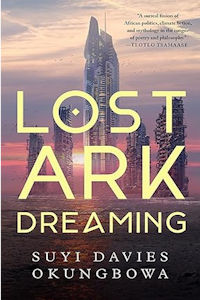Paul Di Filippo Reviews Suyi Davies Okungbowa’s Lost Ark Dreaming
 Lost Ark Dreaming, Suyi Davies Okungbowa (Tordotcom 978-1250890757, hardcover, 192pp, $19.99) May 2024
Lost Ark Dreaming, Suyi Davies Okungbowa (Tordotcom 978-1250890757, hardcover, 192pp, $19.99) May 2024
Thrillers confined to a single stage set or venue have an admirable lineage. One has only to think of the original Die Hard film or David Morrell’s novel Creepers to provide strong examples. In SF, this approach is often conflated with the Big Dumb Object trope: let’s explore Ringworld or Rama. James Cambias’s The Scarab Mission (reviewed here) is a more-recent excellent example.
Lost Ark Dreaming fits squarely into this heritage, while also managing to tackle issues of climate change, inequality, and authoritarianism. It’s got compelling action scenes, colorful, believable characters, and a grabber of a future scenario.
We are in the indefinite climate change future when the African city of Lagos, among many others, has been drowned by rising seas. (Lagos is coming to acquire the fictional centrality of New York or Los Angeles these days, as also seen lately in M. R. Carey’s Infinity Gate. Of course, Okungbowa’s status as a native citizen of Nigeria makes his use of the city even more de rigueur.) Luckily—or perhaps unluckily—back in the 2030s, a rich entrepreneur named Diekara built five enormous residential towers to house refugees. The biggest, Pinnacle, is over a kilometer high. Pinnacle has survived, in somewhat battered shape, to our story’s present day, with its inhabitants socially and economically stratified according to the level they inhabit. And at the very top is a descendant of the founder, Amos Diekara. He will appear onstage only for a short but consequential stint. Mainly, our attention will be divided among three protagonists, good “Midders,” civil servants who end up leading a rebellion.
First and foremost comes Yekini, a woman who is kind of a generalized troubleshooter. When we meet her, she has just gotten an alarming assignment: to venture down to the lowest, ocean-swamped levels of the building to investigate a mysterious incident. In this assignment, she will be paired with an administrator from the Office of Pinnacle Leadership, one Ngozi Nwafor. The two are like oil and water, for Yekini’s sympathies are with all underdogs, and she’s open and empathetic, while Ngozi is a stiff-spined, self-centered bureaucrat, concerned with moving on up the ladder of status.
When the pair descend to the Lowers, Level 9, they meet an engineer named Tuoyo—once a high-dweller, but self-exiled to the depths after a personal disaster. Tuoyo shows them the source of her anomaly report: an airlock breach. Could it be caused by one of the Children?
The Children are an almost legendary race of undersea dwellers with nebulous connections to humanity, deemed hostile and aggressive. If one has penetrated the Pinnacle, a state of utmost emergency exists.
Soon enough—not to spoil any major development for the reader—our trio comes face to face with the intruder, a Child named Omíwálé. But what they discover puts a lie to all the propaganda they have been raised on. Omíwálé is on a mission of enlightenment, to be conveyed by an enigmatic object called the Queen Conch. Once the humans are convinced of his sincerity and purpose and choose to help him, they immediately become outlaws. Now ensues a vertical chase with death around every corner. Can the three converts spread the new gospel before they are cut down by the authorities?
Okungbowa delivers deft action-packed passages alternating with philosophical musings concerned with radically changing one’s life. While our villain in the penthouse remains rather a stock figure, our three heroes display many depths. The biggest and most shocking change comes in Ngozi, who eventually sheds his hidebound ways for a martyr’s halo. And while Yekini moves more or less in a consistent pattern from her origins, her ultimate transcendence is potent.
The tactility and sensory reality of life in the Pinnacle is nicely conveyed, as in a passage such as this:
The smell was the first thing Yekini noted once the doors opened. The Lowers smelled like a damp cloth that had been locked in a steel box for years. It hit her full-on as they emerged onto a wide entryway—a main street of sorts.
The difference in air pressure was next. The whole tower, undersea included, maintained surface pressure to avoid inhabitants getting decompression sickness while moving between levels. Despite that, the air weighed a ton, and Yekini’s lungs worked hard to draw it in. Her chest felt waterlogged, like a bad cough brewing. Her ears popped. Goosebumps spread out over her skin, paper-thin and sensitive.
And then, the darkness.
Yekini was used to not seeing the sun for stretches of time. Much of the Pinnacle’s Midder zone had been constructed with a smattering of portholes, in anticipation of a possible future Third Deluge. Light diffusers and virtual sunshine screens abounded in lieu, and though they were no substitute for the real thing—the light was there, but the heat was missing—Yekini could get by with them. If she ever needed the real sun, she could simply see it through the ports of certain offices at the agency, like Director Merit’s.
But down here, the darkness was different. Though the lights were bright and functional, she couldn’t shake the feeling of being surrounded by an endless night. One power cut, and they would all plunge into the blackness of the deep. The thought of such a possibility caused bile to rise up to her throat and stay there.
Vivid personages, combined with vivid setting, combined with urgent plotting—a winning combo.
You might consider this novel as Kim Stanley Robinson’s reboot of Robert Silverberg’s The World Inside. There’s a drowned urban monad in all our futures.
 While you are here, please take a moment to support Locus with a one-time or recurring donation. We rely on reader donations to keep the magazine and site going, and would like to keep the site paywall free, but WE NEED YOUR FINANCIAL SUPPORT to continue quality coverage of the science fiction and fantasy field.
While you are here, please take a moment to support Locus with a one-time or recurring donation. We rely on reader donations to keep the magazine and site going, and would like to keep the site paywall free, but WE NEED YOUR FINANCIAL SUPPORT to continue quality coverage of the science fiction and fantasy field.
©Locus Magazine. Copyrighted material may not be republished without permission of LSFF.







